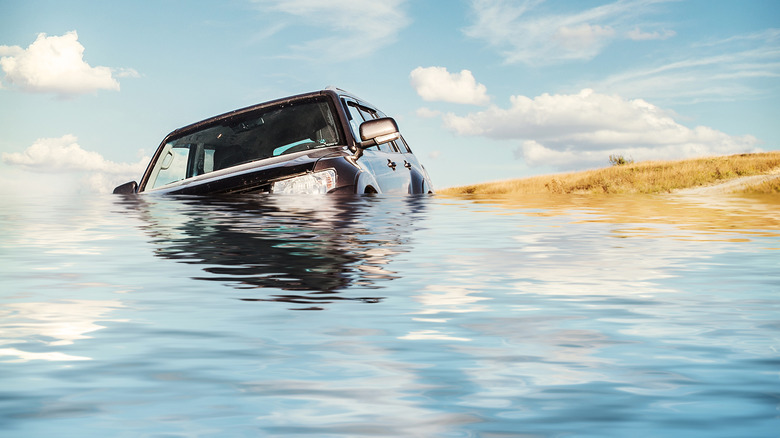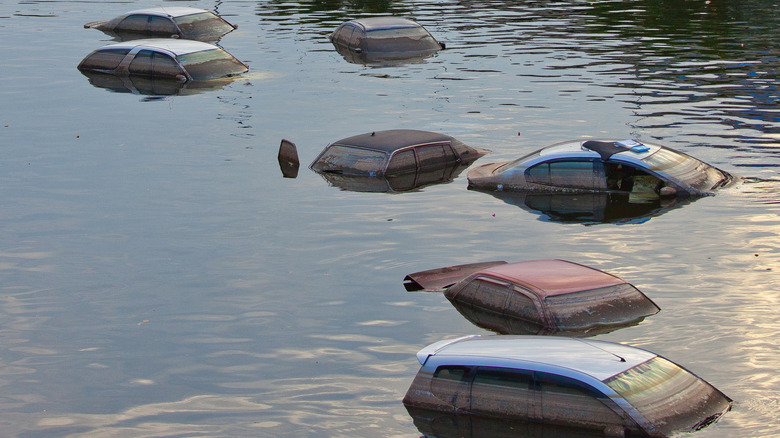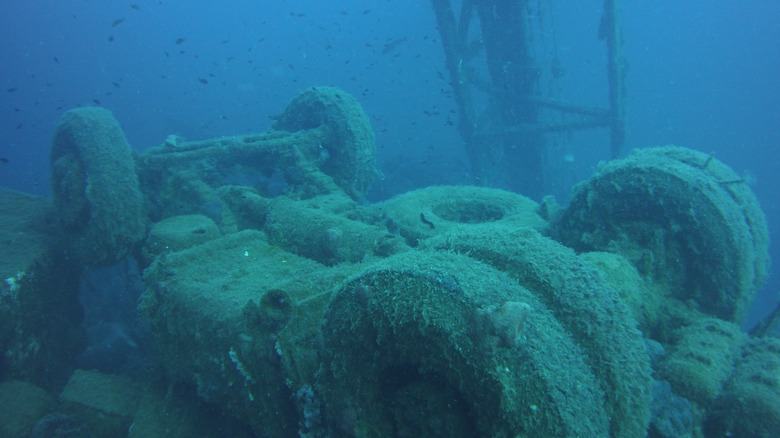What To Do If You're In A Sinking Car
We all know the movie scene, right? Two people are struggling in a car while it careens toward a dock. Maybe the brake lines are cut, maybe the driver woke up at the last second after being drugged, maybe there's no time to swerve, etc. The car goes into the water — splash — and then there's the struggle to get out. The driver kicks the windows, frantically undoes their seatbelt, and drifts slowly down into the murky depths with one arm upraised toward the surface waiting for a last-second rescuer — blah, blah, we know the drill. But where in all that fabricated drama is reality? What should you actually do if, for some bizarre reason, you wind up in the last place you ought to be when driving a car: underwater?
You'll be happy to know that we've got a real answer for you. Common sense plays a big role in escaping from a sinking car: Don't freak out (easier said than done), try to get out as soon as possible (you can only hold your breath for so long), and once out of the car let yourself float to the surface. The tricky part is getting out of the car to begin with. The Washington Post advises what other sites advise — don't use the door to escape. In fact, you likely won't be able to open the door because of water pressure. So hold your breath, slip out of the window, and get moving.
Open the window and flood the car
Escaping a sinking car is (presumably) a horrifying and crazed situation when rational thought would likely go out the window. This is why it's beneficial to learn about what to do now, ahead of time, no matter how unlikely the possibility.
On that point, some escape advice is counterintuitive. We mentioned pressure on the car door, for instance? That pressure will equal about 600 pounds per square inch (psi). So unless you're as jacked as Mr. Olympian-era Arnold Schwarzenegger, that door's not opening. The Washington Post suggests waiting — yes, waiting — for water to fill the car before opening a door because the pressure inside and outside will be equal. As soon as the water hits your chin, take a deep breath, unlock your seatbelt, and slip out. And just like any swimmer knows: Take a couple deep breaths to prime your lungs before inhaling and holding a final, big breath. This whole escape process should take about 30 seconds.
But of course, using the window is better. The Art of Manliness says that automatic windows don't stop working immediately on contact with water. Manual windows might seem better, but the pressure differential will make it hard to roll down the window just like it makes it hard to open the door. That's why — deep breath — Ken Burton of Stark Survival says you ought to roll the window down as soon as possible, even before you hit the water.
Self-defenestration is a bad idea
Now we get to the part of escaping from a sinking car that fits better in an action scene than real life: smashing the window. While self-defenestration might seem like a viable escape option, the truth is you're likely to break your elbow before you smash any glass. And if you're trying to strike a surface through water? It's hard enough to generate enough force to walk in the shallow end of the pool, let alone break glass. That being said, The Washington Post points out that the windows in car doors are much easier to break than windshields because windshields are much thicker. But either way you smash it, the Art of Manliness goes so far as to suggest keeping glass-breaking tools in your car. And if you don't have such a tool in your car? Pivot and smash with your feet if you must — not your arms.
All such advice, however, only works if you're the only one in the car. We all remember the "secure your own mask before helping the person next to you" airplane advice, right? It's true here, too, unless you've got a kid, baby, dog, or other helpless creature in the car. Above all else, make sure everyone on board knows the same basics as you — at least as much as possible. And then before any other step we described, tuck the small one into your arms. Adults will need to manage for themselves.


